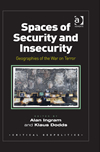Introducing Alan Ingram
 Dr Alan Ingram teaches critical approaches to geopolitics and security in the Department of Geography, University College London, where he is Senior Lecturer.
Dr Alan Ingram teaches critical approaches to geopolitics and security in the Department of Geography, University College London, where he is Senior Lecturer.
He has an MA and PhD from the Department of Geography, University of Cambridge. His current research considers how artists respond to and engage with geopolitics.
Geopolitical Passport
Your relationship with geopolitics
At what age did you discover geopolitics and what attracted you to it?
It was during my undergraduate degree. Inspirational teaching by Graham Smith and Stuart Corbridge on geopolitics and international political economy pretty much coincided with the fall of the Berlin Wall, the collapse of the USSR, wars in Yugoslavia and the 1991 Gulf War. Geopolitics seemed to be a good way to try to understand that.
During my undergraduate degree we were taken on a field trip to the Wash on the East Anglian coast to study salt marshes, but nearby there was an air force range where A10 ‘tankbuster’ planes were firing live ammunition, in preparation for the air war on Iraq. It was quite a few miles away but you could see the planes banking above and hear them firing at the distant range. That episode has come to mind a lot during my current project, in which I’ve spoken to people who were living in Baghdad in 1991.
Which geopolitical topics have your focus and why did you choose especially these?
My PhD looked at the territorial claims of Russian nationalism after the end of the Soviet Union. I was really interested in nationalism from my undergraduate studies and became fascinated by what was happening just after the Soviet break up, which had some parallels but also a lot of differences with what was taking place in Yugoslavia as it was collapsing. In the course of that project I became aware of the revival of interest in geopolitical theory among Russian nationalist thinkers.
My second project looked at how global health issues came to be concepualised and managed in terms of security from the late 1990s onwards. After doing my PhD and teaching for a couple of years I spent some time outside academia working in the policy field looking at the interrelation of global health, foreign policy and security, which was really intensifying at that time. That was interesting in lots of ways, but particularly because of the vast range of actors involved, from doctors, humanitarians and activists to spooks and military types. After a couple of years doing that I returned to academic geography and focused on this in my research in relation to questions of biopolitics, governmentality and security.
My current research focuses on artists’ engagements with geopolitics, with particular reference to responses to the Iraq war in the UK. Here I’m interested in how approaching geopolitics in terms of experimental and aesthetic practices can open up new ways of theorising and intervening.
What do you consider your most important contribution to geopolitics?
 It was widely argued by various theorists of security and global health following Foucault that since the end of the Cold War there had been a shift from ‘geopolitics’ to ‘biopolitics’ and ‘governmentality’. I think my work shows that geopolitics may shift form but doesn’t go away; the two are always intertwined and entangled, enabling and constraining each other.
It was widely argued by various theorists of security and global health following Foucault that since the end of the Cold War there had been a shift from ‘geopolitics’ to ‘biopolitics’ and ‘governmentality’. I think my work shows that geopolitics may shift form but doesn’t go away; the two are always intertwined and entangled, enabling and constraining each other.
Hopefully some interesting things will come out of my current research.
Your geopolitical preferences
What is your favourite definition of geopolitics?
The one I always come back to is from Alexander Dugin, a Russian Eurasianist thinker and activist, who has an unreconstructed take on classical geopolitics, melded with mystical and authoritarian thought: ‘Geopolitics is the world view of power, a science of power and for power’. The question this poses is whether other kinds of geopolitics are possible.
Which geopolitical scientist do you admire the most?
Although I’m interested in experimentalism, I’m not convinced geopolitics can be considered a science. In that vein I would cite not an academic but an artist: Wafaa Bilal, who has conducted some of the most compelling geopolitical experiments I’m aware of. I wrote a paper on one of his projects, Domestic Tension, in which he lived for one month in front of a webcam connected to a paintball gun, and invited people to log on and shoot at him. In the paper I try to explain why his work is interesting from the point of view of geopolitics.
What is your favourite geopolitical book?
Rather than a classic, I’ll go for something current, again from art rather than academia: @earth by Peter Kennard. It’s an entirely visual diagnosis of global crisis, using a series of photomontages. Some of them were adapted for use in protest at the most recent G8 summit in Northern Ireland. Susan Sontag wrote that ‘all photographs wait to be explained or falsified by their captions’ but here there are no captions.
Some theorists have suggested that photomontage had expired as a viable critical strategy but, just as classical geopolitical theory seems to be resilient and making a comeback, so does photomontage as a way of expressing a radically different take on geopolitics that I find endlessly interesting.
What is your favourite geopolitical website?
Not exactly a favourite, but this year I got my undergraduate class to look at Dronestagram, an Instagram feed created by James Bridle that pulls together data on drone strikes and images of strike sites from Google Earth. There’s a post every time a new strike is documented. It raises a lot of interesting questions, especially about whether it has critical implications.
It’s an excellent example of how new technology seems to allow people not directly touched by geopolitical violence to get ever closer to it, while still leaving them remote from its mechanisms and consequences.
bldgblog is also interesting.
The geopolitical future
In what direction(s) will geopolitical science be heading the coming decades?
I don’t know about decades, but maybe as for the next couple of years or so…
As far as the more critical side of things go, there’s growing attention to rethinking the ‘geo’ in geo-politics, seeing the earth as a much more active player in things, which is interesting and will open up lots of new avenues.
I’m sure the role of objects and things like logistics, technologies and infrastructure will become an interesting point of investigation.
I think there’s still a lot more to do to think about different kinds of geopolitical practices. My own research will probably pursue these kinds of issues through a focus on experimental, aesthetic and art practices.
Which geopolitical subject has been too little in the spotlight and needs further research?
It seems to me there’s more interesting research on geopolitics than ever, though it might not go by that name – many of the most interesting prompts, challenges and inspirations come from outside ‘geopolitics’.
The speed of reaction to new developments also seems to be a lot quicker these days, with social media and new publishing opportunities. So ‘research’ of various kinds springs up very quickly around new events, problems and issues – indeed, I think art practices often respond more quickly than academic theory.
But one thing that continues to be interesting to me are the dynamics surrounding secrecy, concealment and disclosure. This has started to be addressed but I think there’s a lot more to do to think about just that which is hidden or ignored structures that which we see and theorise. Most theories of the world don’t – and can’t – take account of the illicit, the covert, the invisible.
It’s been a vital area for exploration and challenge by art and activist practices and I think a lot more research could be done there, especially seeing how this spills across from ‘military’ and ‘security’ domains to the ‘economic’, with ‘secrecy jurisdictions’ etc. A lot is happening around these issues that is often ahead of research in geopolitics.
What will be the largest geopolitical challenge for the world in the 21st century?
There are multiple crises, conflicts and forms of violence that could escalate, spiral outwards and synergise each other, as well as multiple forms of violence implicit in the continuation of things as they are.
The biggest challenge will be the same as it ever was, to come up with concepts and practices that can respond in some way to these crises and conflicts and maybe open up other ways of doing things.
